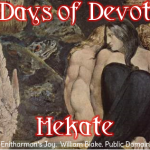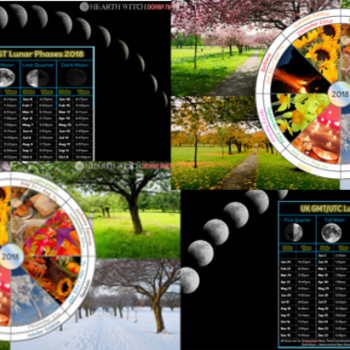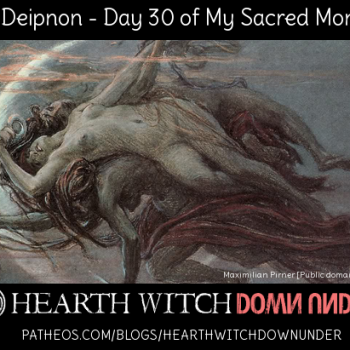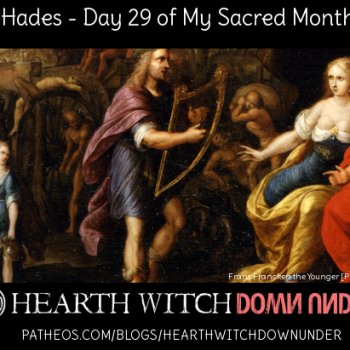This post is part of a blog challenge series, 30 Days of Devotion to Hekate. It’s day 7 and we are looking at Hekates names and epithets.
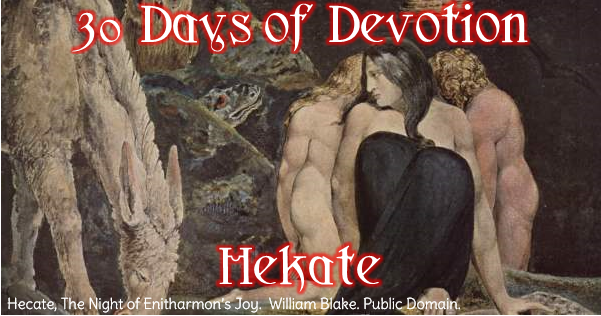
This is a really hard one. Hekate has a lot of names and epithets, and I mean a lot! There is nothing I can write, really, that hasn’t been done better by the lovely Sara Neheti who has devoted time and energy to researching every name and epithet she can find. She has listed hundreds of names, with sources cited where possible. And she is still in the process of writing individual posts about each of those names. It’s a massive project and none of us can do any better.
So today I will simply look at a couple of the names and epithets that I find interesting or that matter to me personally.
Propolos – Guide, Companion, Leader or She Who Leads.
This one is perhaps obvious to anyone who knows anything about Hekate, or has read my previous posts in this series – it refers of course to Hekate being the guide for Persephone each year, out of the Underworld. But She is also the guide for the dead, the ghosts on leaving the Underworld and wandering the world.
Trioditis and Enodia – Of the Crossroads
These epithets are also perhaps obvious, Hekate is often referenced with crossroads, especially threeway ones, but also fourway ones sometimes. She is commonly seen at the crossroads, and it is where we are meant to place Her Deipnon offerings. The crossroads are considered liminal places, obviously, being of no road, but of all roads at once.
Propylaia – The One Before the Gate & Kleidoukhos – Keeper of the Keys.
As the Keybearer Hekate is the one who opens the gates to the Elysian Fields, or not, it is She who is said to decide who can enter. Thus of course She is also the one before the gates. She has long been connected to various boundaries and entrances, doorways and gates being the prime example – people would keep small shrines to Her just outside of their doorways, these would, for the Deipnon, serve as makeshift crossroads as well.
The epithets above are all connected in my mind, and I think many devotees and worshippers of Hekate would agree with me for the most part. So let’s break down what they all mean on a more personal level and how they connect together.
I am not the only one to note that Hekate can be felt as an almost constant presence in your life, a constant companion who is always there, even if only lightly. It’s kind of like seeing someone out of the corner of your eye.
She is our Guide and She does lead us, but I note She seems to do so in a subtle kind of way. She doesn’t drive us on with a whip or anything, She pushes us, gently and subtly, trying to make sure we don’t get stuck where we shouldn’t be. When we are coming up to a time where we need to make a change, when we need to make a choice She will gently push us towards that choice.
Towards the crossroads that we must face, the place where we must choose our next path. She doesn’t, usually, ask us to make any specific choice, She pushes us to make a choice, any choice, but let us not stand there stagnating.
And She is always there, behind us and beside us, pushing us on, but She is there before us, before the gates. It is She who pushes us to take the keys and unlock the gate or door to our next stage – whether that is internal or external, it is She who helps us face what must come. It should be noted that Her epithet as Torchbearer also plays into all of this, as She lights our way forward.
As the Keybearer and Gatekeeper She also brings us something else though. For me, and I know this holds true for many Devotees of Hekate, these epithets also refer to knowledge, secrets, mysteries and wisdom. That which is hidden, is that which She guards and can unlock for us.
This is perhaps one of the things that many of us Hekateans have in common, indeed many of us Pagans and Polytheists in general – our pursuit of knowledge and unlocking the mysteries of the past, the present, the future, the world and the universe and even other worlds. I think this is one of the reasons why Hekate is so attractive to so many of us.
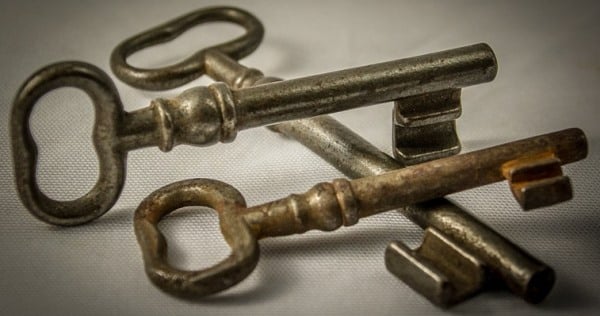
Kourotrophos – Nurse of the Young
As a mother first and foremost, Hekates nurturing and child protecting aspects are of course a standout point to me. I don’t know what else to add, I am a mum, I have kids, it’s a no brainer really.
Soteira – Saviour
In truth I never really paid much attention to this one before this year, I thought it looked and sounded nice (assuming I pronounce it right), but I didn’t really care about it. But I guess it’s a natural by-product of joining the Covenant of Hekate that I started to pay more attention to this epithet and what it means. So it has come to mean more to me, especially over most of Her other names and I am learning more about this aspect of Her – but I don’t know a lot yet.
Now that is done I suggest you go look at Sara’s blog posts on Hekates epithets, she includes sources too which is always fantastic.
30 Days of Deity Devotion
1 – A basic introduction of the deity
2 – How did you become first aware of this deity?
3 – Symbols and icons of this deity
4 – A favourite myth or myths of this deity
5 – Members of the family – genealogical connections
6 – Other related deities and entities associated with this deity
7 – Names and epithets
8 – Variations on this deity (aspects, regional forms, etc.)
9 & 27 – Common mistakes and worst misconceptions about this deity
10 – Offerings – historical and UPG
11 – Festivals, days, and times sacred to this deity
12 – Places associated with this deity and their worship
13 – What modern cultural issues are closest to this deity’s heart?
14 – Has worship of this deity changed in modern times?
15 – Any mundane practices that are associated with this deity?
16 – How do you think this deity represents the values of their pantheon and cultural origins?
17 – How does this deity relate to other gods and other pantheons?
18 – How does this deity stand in terms of gender and sexuality? (historical and/or UPG)
19 – What quality or qualities of this god do you most admire? And find the most troubling?
20 & 21 – Art and music that reminds you of this deity
22 – A quote, a poem, or piece of writing that you think this deity resonates strongly with
23 – Your own composition – a piece of writing about or for this deity
24 & 25 – A time when this deity has helped you, and refused to help
26 – How has your relationship with this deity changed over time?
28 – Something you wish you knew about this deity but don’t currently
29 – Any interesting or unusual UPG to share?
30 – Any suggestions for others just starting to learn about this deity?

